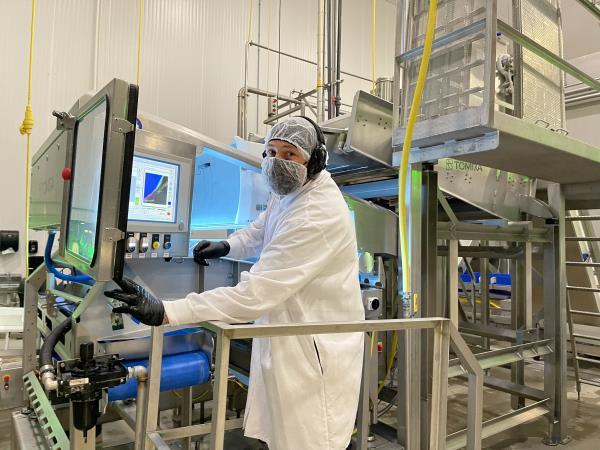GC Farms saves on labor costs for sorting by 75% with the TOMRA Insight Data Platform
VU | TOMRA Food
George Chiala Farms is one of numerous vegetable processors which utilizes the TOMRA Insight data platform. This platform gathers data from sorting machines which can be utilized immediately to optimize machine settings and retrospectively to take smart business decisions.
GC Farms is a family-run business located in the Santa Clara Valley. The company was founded in 1942 and then, in 1984, emerged its first processing plant. Today it is focused on the production of prepared vegetable ingredients for different American brands which produce soups, salsas, and frozen entrees.
The business possesses 2 processing plants in Central California: one in Hollister and the other in Morgan Hill.
There are 500 employees who process over 54 million kilos of vegetable ingredients annually.
This throughput requires around 68 million kilos of raw vegetables, some grown by GC Farms and some by other suppliers.
According to Charles Cutler, GC Farms’ Director of Operations, the industry moves toward ready-to-eat products, and customers’ quality expectations also increase. Quality used to mean guaranteeing food safety, but now it’s about making the product perfect.
That’s why in the last few years they switched from manual sorting to automated sorting. This allowed them to reduce and stabilize their labor force, and also reduce their labor costs for sorting on their Hollister line by 75%.
TOMRA Insight collects data in near real-time and stores it in the cloud so that it can be reached from anywhere via web-based desktop or mobile devices. This data platform continuously measures the quality of the processing line’s material stream and as a result, operators can make quick adjustments to machine settings in response to changes in material composition on the line.
TOMRA Insight also provides deep-dive data that wasn’t accessible before, which enables managers to make operational and business decisions based on more detailed information.
The sense of this information is huge. Downtime can be decreased by monitoring machine health, supporting the management of predictive and condition-based maintenance, and preventing unforeseen machine shutdowns. Variations of throughput can be evaluated to improve efficiencies: a process manager might find out that by optimizing the sorter’s infeed it becomes possible to process one more ton per hour over the sorter without influencing the quality of sorting. Cost can be lowered by minimizing waste and maximizing yield.
Morgan Hill plant currently uses one TOMRA 5A belt sorter and two TOMRA Sentinel II belt sorting machines. The Hollister plant also utilizes one TOMRA 5A, and one Genius belt sorting machine plus one Blizzard free-fall machine.
These machines at Morgan Hill are connected to TOMRA Insight. In the first months of its usage, the plant has already seen 2 benefits: enhanced control over line rates, which optimizes line efficiency and throughput, and ability to precisely evaluate the quality of incoming raw materials, which saves the company from paying over the odds when quality is not appropriate.
According to Cutler, whenever the company had a bad batch of vegetables, they’ve been able to discuss this with their growers by sharing the TOMRA Insight report. This report guarantees they pay a fair price for what they’re receiving, and it can help growers determine if there are any issues that they need to address to better their profitability and processes.
TOMRA Insight also enables users to create reports specific to batches rather than a certain time frame. Soon there will be an automated reporting feature that will indicate the number of requirements to be reported on, the frequency of reports, and emails to which they should be sent.
According to Cutler, recent updates of TOMRA Insight have included batch reporting; conversions from imperial to metric weight units; charts giving defect composition in percentages; and general improvements of usability.
TOMRA Food is a producer of sensor-based sorting machines and integrated post-harvest equipment for the food industry. The company uses one of the world’s most advanced grading, sorting, peeling and analytical technology.
Their main goal is to help their customers to improve returns, gain operational efficiencies, minimise food waste, ensure quality and a safe food supply with sustainable technologies.
Their solutions are installed at food growers, packers and processors around the world. This allows businesses to maximise productivity and recovery rates, while reducing food waste and developing the overall quality of the produce.
To learn more about TOMRA Food, follow the link.





